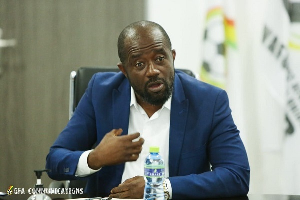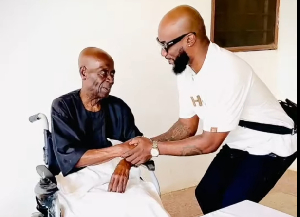A political historian and lecturer at the Political Science Department of the Kwame Nkrumah University of Science and Technology, Dr Samuel Adu Gyamfi, has advised traditional rulers, who openly declare support for politicians, to quit the practice as it defiles their thrones.
According to him, chiefs who endorse politicians divide opinion in their communities, a situation, which, he said, departs from their traditional role of uniting their subjects for progress and development.
Dr Adu Gyamfi said these in an interview with Nana Ama Agyarko on Accra News on Thursday April 28, 2016, in response to recent comments by some chiefs, who have endorsed President John Mahama as he tours the country.
The president was, on Wednesday April 27, during the inauguration the Abease Community Senior High School in the Brong Ahafo Region, assured by the chief of Abease, Obrempong Kru Takyi II, of a “thank you vote” in the upcoming presidential election for his “continued development” of the area.
A fortnight earlier, while the president was in the Eastern Region touring, the acting Okwahumanhene, Nana Asiedu Agyeman III, expressed the appreciation of the Kwahu people for the projects the government had carried out in the area, and backed the president’s second four-year term bid.
But Dr Adu Gyamfi said chiefs must steer clear of active partisan politics, as demanded by Article 76 of the 1992 Constitution of Ghana, which expressly forbids chiefs from such activity.
“We have hammered on this issue, but it seems that is the course some chiefs have decided to take,” the academic said, adding: “… What some of these chiefs are doing is a desecration of their thrones. It desecrates their thrones fundamentally because if you are a chief, traditionally, you are the embodiment of the spirit, soul, and body of your community. You unite all subjects. And you unite them first, in terms of culture. Secondly, you bring them together for oneness, and, thirdly, you unite them for purposes of development.”
He disagreed with opinions that the trend was in tune with customary practice, saying: “I beg to say that what is going on is not cultural. Secondly, it is a disgrace to their stools and they should move away from such.”
Asked if subjects could be swayed to vote for candidates and parties endorsed by chiefs, the lecturer said it was certain that a few would heed such call though most of the votes such politicians or parties would garner would come from those, who already belong to that party.
He, however, said “there is no need to take such chiefs seriously”, as the significance of the positions they occupy has been lost on them.
“As a chief, because you hold the land for and on behalf of the people, you ensure that the property of the community, as well as the interests of citizens is protected. So, if you reckon that because of one school or hospital or road, people should not follow their opinions, and, so, you are using your traditional influence to persuade them to vote for one party, then we can question you the chief on what particular project you have undertaken for your community,” he observed.
“A chief can commend a politician for a project undertaken in his area and ask for more. But to assure the president or other political party flagbearer that his people will offer him a ‘thank you vote’, it means he is not in touch with culture. It is a slippery territory.”
General News of Friday, 29 April 2016
Source: classfmonline.com

















